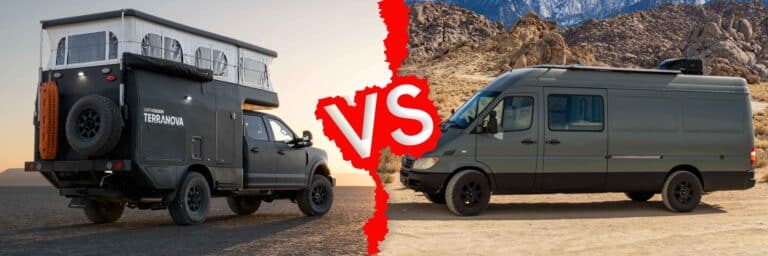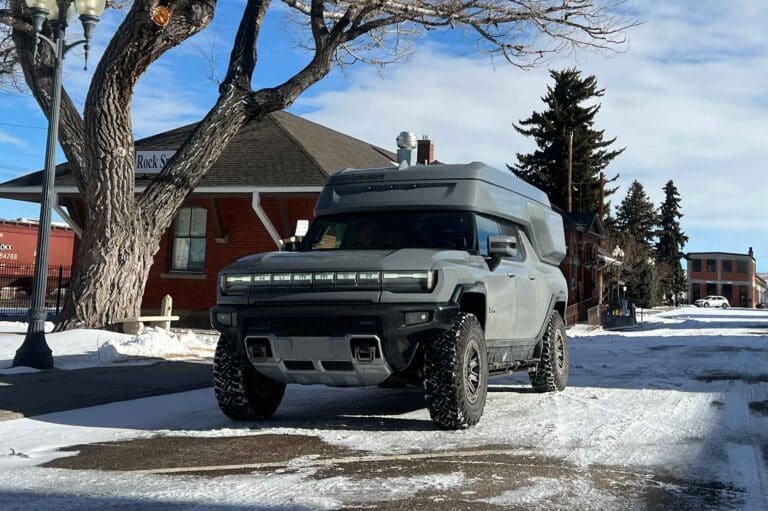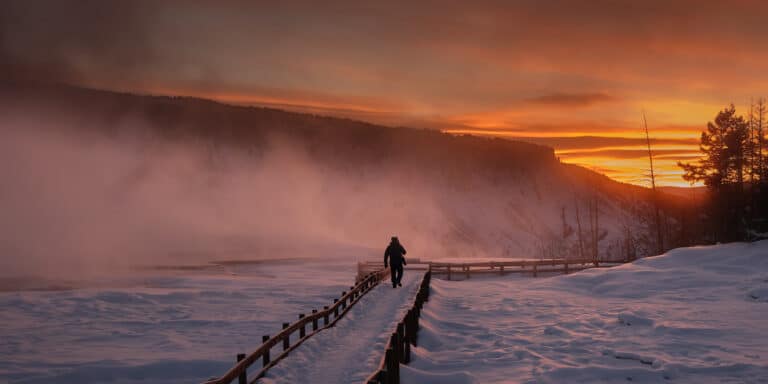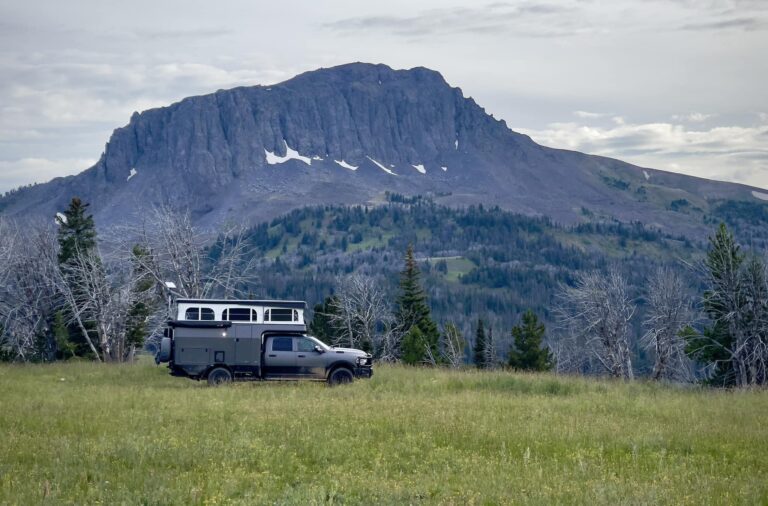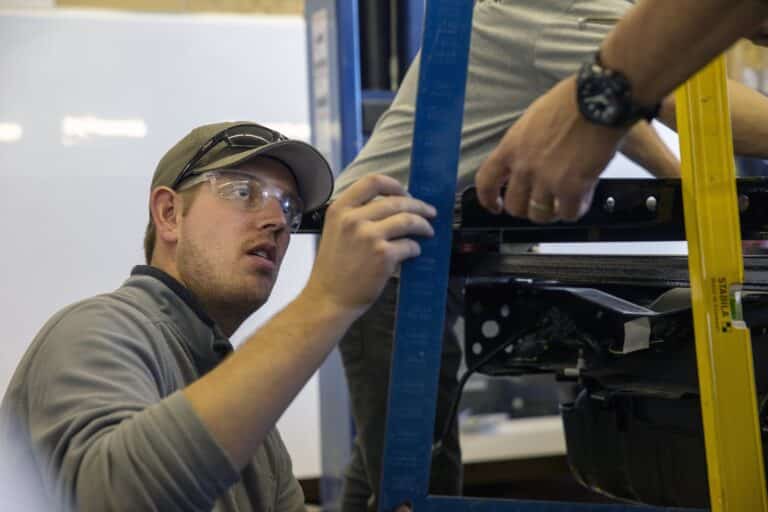We hear it all the time. A couple comes in to look at one of our vehicles, and one pulls us aside to gently let us know that their other half is what we call “outdoors-averse.” You might be ready to roll into the sunset, but your partner, or kids, might not be convinced.
Relationships are all about communication and compromise. Here are a few tried and true ways to nudge your potential adventure partners toward your (and our) way of thinking:
Demonstrate that Overlanding Does Not Have to Equal Uncomfortable
EarthCruiser founder Lance Gillies often reminds us that “there’s no prize for being the most uncomfortable at camp.” Founder Michelle Boltz is as well-known for her incredible camp meals as her passion for travel to far-flung places. These people have overlanded through some of the world’s toughest environments. They also appreciate comfort and a good night’s sleep to make their adventures safer and more enjoyable.
One of the biggest concerns we hear is a fear of missing the comforts of home while traveling. They worry that overlanding equates to a rock-hard bed, lack of privacy, and poor sanitation. And when you look at most overlanding resources on the internet, you can understand why. Most discussions are about horsepower and ground clearance. Meanwhile, their mind is trying to picture what their day-to-day living experience will feel like. What can you do? Listen to these concerns and discuss them with the same seriousness you might give wheel size.
An adventure in a luxury expedition vehicle means getting off the beaten path. It also means hot showers, a comfortable living space in any season, plenty of places to charge your devices, and a full working kitchen. Our interiors are functional and comfortable. And they’re easy to keep clean. Wherever you go, the comforts of home are with you.
Start Small & Local
Outdoors-averse people often fall into one of two categories – those who haven’t been exposed to the outdoors and those that have had negative experiences. While it may not possible to convert someone to your level of enthusiasm, a bit of patience combined with a few baby steps can help steer them toward loving the great outdoors.
Those new to the outside world can be intimidated by the endless array of gear and terminology used by overlanders. A bite-sized adventure is the ticket to getting them excited for something more epic down the road. Strip things down to their essentials.
Sometimes an aversion to the outdoors stems from past negative experiences. Hikes that felt like forced marches. Sleepless nights due to improper equipment. Showing an understanding of these experiences can help to build trust.
Take them on short hikes with beautiful views, pack a picnic lunch, and take lots of photos to remind them of the beauty they experienced. Be patient, let them pick the pace, laugh, and keep things light.
You can tailor these trips to their interests. Are they a gym rat with a competitive streak? Introduce them to trail running. Animal lover? Sign up for a short trip with a naturalist and pack a pair of binoculars and a field guide. A teenager who spends a lot of time on social media? Take time to create beautiful photos and videos with them.
By keeping these outings short and light, they’ll remember far more fun moments than uncomfortable ones.
Cook Up a Five-Star Meal
Memories of camping can conjure up visions of energy bars, chili from a can, and dehydrated dinners from a bag. There’s nothing wrong with quick and easy energy sources. But there is no reason you can’t prepare amazing food on the road. What better way to help someone fall in love with the outdoors than a candlelight meal overlooking the Grand Canyon at sunset?
Invest in quality cookware, cutlery, and tableware. Your gear should be durable, packable, and ideally multi-purpose. That doesn’t mean it can’t also be pretty. Opt for quality ingredients. More farms, ranches, and vineyards are starting to offer opportunities to stay on their properties overnight, making it even easier to pair a fantastic wine with a view over the vines.
A quality outdoor table and chair set can enhance any meal. Set the table with a bouquet, and it’s easy to see why we think everything tastes better outdoors.
Let Them Take Ownership of Some of the Adventure
When we’re worried someone isn’t enjoying themselves, we can become overly helpful. We think by doing everything for someone they will relax. Sometimes that’s helpful. It can also have the opposite effect. By doing everything, other group members may feel they’ve been drug along on someone else’s dream.
Instead, empower them. Pick something that person enjoys and make it theirs. By letting your partner own a part of the adventure, they might want more of the overlanding experience. This might be camp meals, navigation, driving, or organizing and cleaning. Just ensure they genuinely enjoy the experience and it doesn’t become a job.
Overlanding is a great way to introduce small responsibilities to kids. Put one in charge of camp games; another can produce the trip’s documentary or plan desserts and snacks. I once charged a young overlander with the very serious task of presenting one dad joke over breakfast each morning. He loved the challenge, and we started each morning with a chuckle (or groan). A child will remember the trust they are shown when given the responsibility of building the evening’s campfire.
Give Them Space to Drive and Explore on Their Own
Overland driving can seem intimidating. Throw in the added pressure of driving an expedition vehicle that may feel larger or different to drive than the family car, and it’s understandable why not everyone feels immediately comfortable behind the wheel. We know EarthCruisers are comfortable and easy to drive. But we are also sympathetic to the nerves many feel when they come in to pick up their new truck. This is one of the reasons we provide a multi-day training experience with the delivery of our vehicles.
Sometimes half of a couple will default to being the co-pilot. Nothing is wrong with this unless that person isn’t enjoying the experience. If you suspect more time in the driver’s seat will bring your partner more confidence, you can do a few things to facilitate that. One is to provide them one-on-one training with one of our expert, patient instructors.
You might also send them out on a short, solo adventure. A few hours behind the wheel without the pressure of having a backseat driver, whether real or imaginary, can do wonders for confidence building. If they’re keen, sending them out overnight solo or with a friend may boost their comfort with driving. When everyone in the party understands their off-road rv, it makes for a more enjoyable experience and helps ensure everyone feels self-sufficient.
It can take time and patience to change someone’s mind. This is especially true with a significant shift in lifestyle. With these tips, a sense of humor, and empathy, we hope we can help everyone with dreams of overlanding share them with the people they care about most.






